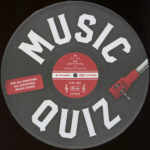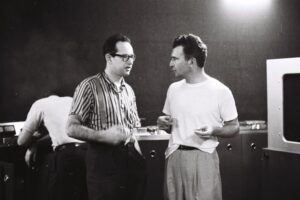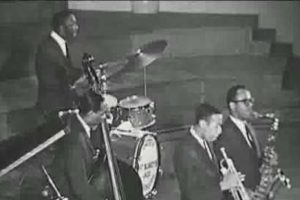Stephon Alexander thinks that two of his favorite things — improvisational jazz and quantum physics — are deeply linked.
Saying quantum science is weird is like saying that Stevie Ray Vaughan could play guitar. It is bizarre, counter-intuitive and impossible to really understand – and that’s water cooler talk in physic grad school faculty lounges.
Two examples: The results of experiments change depending upon whether it is being watched or not and something that happens to a particle on one side of the universe automatically and instantaneously changes an “entwined” particle on the other side.

Another crazy reality about quantum behavior is pointed to by Alexander in the video above. A particle moving from point A to point B traverses all possible paths. Routes from New York to Boston including driving up I-95—but also going through Europe, China, Oklahoma and Pluto. Alexander says that jazz improvisation does the same thing. Between the jumping off point and the end – the return to the main melody – the musician has unlimited choice. The musician can consider any path, just as the quantum particle.
Alexander, who I saw by chance on PBS a few months ago, raises questions about the relationship between science and art. It’s always interested me that the human mind works to perceive things in the world as beautiful. The sounds made by a violin are nothing more than strings vibrating at a specific frequency. A sunset is the result of energy from the sun using water droplets in the atmosphere as a prism and emitting certain frequencies of light depending upon the angle at which the light hits. But our minds accept those things as beautiful and sublime. They are. But they also are science.
Scientists and mathematicians have another (or additional) view of beauty. Einstein had trouble accepting quantum science (though it was largely his idea) because it was not “elegant” and seemed to rely on chance, something that offended his sensibilities about the grace of the universe. Perhaps there is a tie between mental health and finding things that we think are beautiful and thus give us pleasure.
It sounds slightly odd to many of us when a scientist or mathematician refers to a theorem or experimental result as “beautiful” or a chess grandmaster refers to a match in the same way. It seems, however, that separating human endeavors (a painting is beautiful but a algorithm is a cleverly arranged bunch of numbers) in this way is a modern thing. As Walter Isaacson makes clear in his unique biography of Leonardo DaVinci, learned people of the past didn’t distinguish between art and science. DaVinci’s mind-boggling discoveries span both areas (and others—the guy was a trip).
He is known as an artist, but suggested how heart valves work about 500 years before the means existed to test his theory (he nailed it), threw off ideas that anticipated atoms, accurately theorized about helicopters, essentially invented anatomical drawing and on and on. That’s just the very tip of a massive iceberg. We know DaVinci today primarily as an artist because much of his other work was destroyed. Unlike Michelangelo, who was a contemporary, he also supposedly was a nice guy.
The point isn’t how brilliant DaVinci was, though it’s fun to think about. It’s that he made no distinction between art and science. They flowed from the same thing. This seems to be what Alexander is thinking.
No post like this would be complete without a quick Einstein story. This one is especially appropriate because it involves music: Einstein was an amateur violinist. At one rehearsal during his stay at Princeton he came in a beat early. The conductor looked at him and said, “What’s the matter, Professor Einstein? Don’t you know how to count?”
Below is “Running the Cosmos” from Alexander and Rioux. Here is Alexander’s website.











Recent Comments